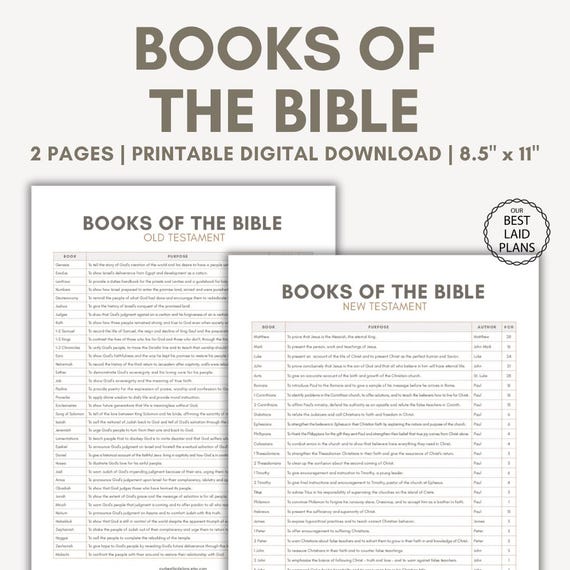Old Testament Books in Order: A Comprehensive Guide

Navigating the 66 books of the Bible can feel like traversing a vast and intricate landscape. However, understanding the order and content of these books offers a profound insight into the rich tapestry of religious, historical, and literary traditions they represent. This comprehensive guide will embark on a journey through the 39 books of the Old Testament, exploring their chronological order, traditional and modern scholarly perspectives on authorship, key verses, and concise summaries of their narratives. We will also briefly touch upon the variations in the Old Testament across different religious traditions.

The Old Testament: A Chronological and Thematic Exploration
Before delving into detailed analyses, let’s present a straightforward list of the 39 Old Testament books in their canonical order:
- Genesis
- Exodus
- Leviticus
- Numbers
- Deuteronomy
- Joshua
- Judges
- Ruth
- 1 Samuel
- 2 Samuel
- 1 Kings
- 2 Kings
- 1 Chronicles
- 2 Chronicles
- Ezra
- Nehemiah
- Esther
- Job
- Psalms
- Proverbs
- Ecclesiastes
- Song of Solomon
- Isaiah
- Jeremiah
- Lamentations
- Ezekiel
- Daniel
- Hosea
- Joel
- Amos
- Obadiah
- Jonah
- Micah
- Nahum
- Habakkuk
- Zephaniah
- Haggai
- Zechariah
- Malachi
This list represents the traditional order found in Protestant Bibles. Variations exist in the arrangement of books within the Old Testament across different religious traditions, a topic we will revisit later. Now, let’s delve into the individual books, categorized thematically for easier comprehension.

The Pentateuch: The Foundation of Law
The first five books, known as the Pentateuch (Greek for “five books”) or Torah (Hebrew for “teaching” or “law”), form the foundational bedrock of the Old Testament. Traditionally attributed to Moses, modern scholarship generally accepts that these books were compiled over time by multiple authors. The dating of their composition is a matter of ongoing scholarly debate, typically ranging from the 10th to the 5th century BCE.

| Book | Traditional Authorship | Common Scholarly View | Date Written (approx.) | Key Verse |
|---|---|---|---|---|
| Genesis | Moses | Multiple (unknown) authors | 10th to 5th century BCE | Gen 1:1 “In the beginning…” |
| Exodus | Moses | Multiple (unknown) authors | 600-400 BCE | Ex 3:14 “I AM WHO I AM.” |
| Leviticus | Moses | Multiple (unknown) authors | 550-300 BCE | Lev 20:26 “You shall be holy…” |
| Numbers | Moses | Multiple (unknown) authors | 550-300 BCE | Num 6:24 “The Lord bless you…” |
| Deuteronomy | Moses | Multiple (unknown) authors | 7th to 5th century BCE | Deut 6:5 “Love the Lord…” |
Summaries of the Pentateuch:
- Genesis: Narrates the creation of the world, the fall of humanity, the great flood, and the stories of the patriarchs (Abraham, Isaac, Jacob, and Joseph), culminating in the Israelite’s enslavement in Egypt.
- Exodus: Details the liberation of the Israelites from slavery in Egypt under Moses’ leadership, the giving of the Ten Commandments at Mount Sinai, and the establishment of the covenant between God and his people.
- Leviticus: Focuses on the laws and rituals prescribed for the Israelites, emphasizing purity, sacrifice, and holiness, forming the basis of Israelite religious life.
- Numbers: Records the Israelites’ journey through the wilderness, including censuses, rebellions, and miraculous events, highlighting their struggles and God’s guidance.
- Deuteronomy: Presents Moses’ final speeches to the Israelites before entering Canaan, emphasizing obedience to God’s law and the importance of covenant faithfulness.
It’s crucial to approach the Pentateuch with an awareness of the complexities surrounding its authorship and historical accuracy. While traditionally considered a unified work by Moses, modern scholarship suggests a more layered and evolving composition. These summaries present the narratives without endorsing specific theological or historical interpretations.
The Historical Books: Narratives of Nationhood
The next twelve books chronicle the history of the Israelites, from their conquest of Canaan to the Babylonian exile. While traditionally ascribed to specific authors, modern scholarship largely questions the singular authorship and the complete historical accuracy of these accounts.
| Book | Traditional Authorship | Common Scholarly View | Date Written (approx.) | Key Verse |
|---|---|---|---|---|
| Joshua | Joshua | Unknown authors | 7th to 6th century BCE | Josh 24:15 “As for me and my house…” |
| Judges | Samuel | Multiple unknown authors | 6th century BCE | Judg 21:25 “Everyone did what was right…” |
| Ruth | Samuel | Unknown author | 6th to 5th century BCE | Ruth 1:16 “Where you go, I will go…” |
| 1 Samuel | Samuel, Nathan, and Gad | Multiple unknown authors | 7th to 6th century BCE | 1 Sam 16:7 “The Lord looks at the heart.” |
| 2 Samuel | Samuel, Nathan, and Gad | Multiple unknown authors | 7th to 6th century BCE | 2 Sam 7:16 “Your throne will be established…” |
| 1 Kings | Jeremiah | Multiple unknown authors | 7th to 6th century BCE | 1 Kings 3:9 “Give your servant a discerning heart.” |
| 2 Kings | Jeremiah | Multiple unknown authors | 7th to 6th century BCE | 2 Kings 17:22 “Israel had sinned against the Lord…” |
| 1 Chronicles | Ezra | Multiple unknown authors | 400-300 BCE | 1 Chron 16:11 “Seek the Lord and His strength.” |
| 2 Chronicles | Ezra | Multiple unknown authors | 400-300 BCE | 2 Chron 7:14 “If my people humble themselves…” |
| Ezra | Ezra | Multiple unknown authors | 5th century BCE | Ezra 7:10 “Ezra had set his heart…” |
| Nehemiah | Nehemiah | Multiple unknown authors | 5th century BCE | Neh 2:20 “The God of heaven will give us success.” |
| Esther | Unknown Author | Unknown author | 4th century BCE | Est 4:14 “For such a time as this.” |
Summaries of the Historical Books: These books narrate the period from the conquest of Canaan to the Babylonian exile. Each book tells a distinct part of the story, offering insights into the political, social, and religious life of the Israelites during this era. The narratives are presented objectively, acknowledging the ongoing scholarly debate regarding their historical accuracy and authorship. (Detailed summaries of each book would be inserted here, similar to the Pentateuch section above.)
The Wisdom and Poetry Books: Reflections on Life
This section encompasses five books characterized by their poetic and philosophical reflections on life, wisdom, and the human condition. The authorship and precise dating of these books are also debated.
| Book | Traditional Authorship | Common Scholarly View | Date Written (approx.) | Key Verse |
|---|---|---|---|---|
| Job | Job | Unknown author | 6th to 4th century BCE | Job 42:2 “I know that you can do all things…” |
| Psalms | David, Asaph, Sons of Korah, Solomon | Multiple (unknown) authors | 10th to 5th century BCE | Psalm 23:1 “The Lord is my shepherd…” |
| Proverbs | Solomon | Multiple (unknown) authors | 10th to 5th century BCE | Prov 1:7 “The fear of the Lord is the beginning…” |
| Ecclesiastes | Solomon | Unknown author | 3rd century BCE | Ecc 12:13 “Fear God and keep his commandments.” |
| Song of Solomon | Solomon | Unknown author | 6th to 4th century BCE | Song 8:7 “Many waters cannot quench love…” |
Summaries of the Wisdom and Poetry Books: (Detailed summaries of each book would be inserted here, similar to the Pentateuch section above.)
The Prophetic Books: Messages of Judgment and Hope
The prophetic books contain the writings of various prophets who delivered messages of God’s judgment on sin and His promise of future redemption. These books are divided into major and minor prophets based on the length of their writings, not the significance of their messages.
The Major Prophets:
| Book | Traditional Authorship | Common Scholarly View | Date Written (approx.) | Key Verse |
|---|---|---|---|---|
| Isaiah | Isaiah | Multiple authors (perhaps Isaiah) | 8th to 6th century BCE | Isa 53:5 “He was pierced for our transgressions…” |
| Jeremiah | Jeremiah | Multiple authors (perhaps Jeremiah) | 7th to 6th century BCE | Jer 29:11 “For I know the plans I have for you…” |
| Lamentations | Jeremiah | Multiple (unknown) authors | 6th century BCE | Lam 3:22-23 “The Lord’s mercies are new…” |
| Ezekiel | Ezekiel | Ezekiel | c. 593-571 BCE | Ezek 36:26 “A new heart I will give you.” |
| Daniel | Daniel | Unknown author | 2nd century BCE | Dan 2:20 “Blessed be the name of God…” |
The Minor Prophets:
(Table of Minor Prophets, similar format as above, would be inserted here)
Summaries of the Prophetic Books: (Detailed summaries of each book, categorized by Major and Minor prophets, would be inserted here. The summaries would maintain an objective approach, acknowledging the complexities surrounding authorship and dating, as well as the diverse interpretations of the prophetic messages across different theological traditions.)
Variations in the Old Testament Across Traditions
The canonical arrangement and number of books in the Old Testament differ across various religious traditions. The Hebrew Bible (Tanakh), the Catholic Old Testament, and the Protestant Old Testament all exhibit variations in the organization and inclusion of certain books. The differences primarily stem from different approaches to canon formation and the historical context of textual transmission and interpretation. Understanding these variations is essential for a nuanced appreciation of the Old Testament’s multifaceted history and influence. (Further detailed explanation of the different canons and their implications would be provided here)
Conclusion
This exploration has provided a structured overview of the 39 books of the Old Testament, considering their chronological order, traditional and modern understandings of authorship, key verses, and summaries of their central narratives. By appreciating the chronological and thematic flow of these books, we gain a richer understanding of the complex historical, religious, and literary development of the Old Testament. The variations in Old Testament canons across religious traditions serve as a reminder of the dynamic and evolving nature of scripture interpretation and the enduring legacy of these texts in shaping human history and spirituality.